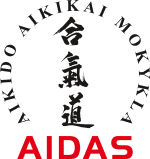Entering the dojo
Be punctual and don’t be late. You must be on tatami at least 5 minutes before the Aikido training. During that time you must prepare yourself properly and focus on the training. If you enter the dojo earlier, warm up yourself and drill the base movements alone or with a partner.
If you are late, sit down aside on tatami and wait until instructor invites you to join. When it is allowed to join the practice, sit down and bowO-Sensei direction. If warm-up is ended, warm up yourself aside without disturbing others. As always, be awake and watch others who work nearby you and if there is a need make some space for ukemi.
Lateness for objective reasons, like work schedule, is justifiable. However, lateness due to the bad planning or absent-mindedness shows lacking of discipline and serious attitude towards Aikido practice. It is important to have serious attitude towards this, otherwise it can obstruct your progress.
Rei
Aikido it is not only physical movements and exercises but the attitude and philosophy of life. We express our respect by bow. Rei can be translated as “respect and openness”. It is not only the formal movement of bow but more like an inner state and attitude towards the life. Rei is performed to O-Sensei , dojo, sensei and partners.
Rei in the dojo
When you enter the dojo, you must always wear slippers or zori (sandals).
Before you step on the tatami take off the slippers and put it by the edge of the tatami. Disorderly placed slippers show improper state of mind.
When you step in the tatami, sit down in seiza and bow by placing your hands together in front of your knees, keeping your back straight. It is also necessary to bow when you leave the dojo. If there is a need to step off the tatami during the training, ask for permission. Only then you can step aside by performing rei.
Rei to sensei
After O-Sensei salutation you must bow to sensei or instructor. It is performed sitting in seiza. If the training hasn’t been started but sensei is in the dojo, it is necessary to perform rei to him. In the beginning it is a tradition to say Onegai-Shimasu (Teach me, please) while performing the rei to sensei and Domo arigato gozeimashita (Thank you for the training) in the end of the training.
Rei to partner
Your partner is your mirror. Disrespect to your partner and exaltation of yourself contradict Aikido spirit. We work with a partner not to defeat him or her but to seek for opportunities to improve and develop our skills. Be respectful and friendly towards others who work on the tatami despite the age and their Aikido achievements. Don’t forget that your partner is your reflection. So if you help your partner you help yourself. Before start working and after finishing perform Rei to each other.
Senior aikido trainees are your support and backup in the path. Despite the age, social status or gender they deserved juniors respect. In this case senior student cannot be abusive. They must remain kind and honest. It requires responsibility not only for their action but for entire atmosphere of the dojo.
Rei to weapons
Before using any weapon (boken, jo, tanto) lift it up with your both hands and bow to O-Sensei’s direction. When it is worked with weapons it is sought that weapons would become a continuity of your body. This is a reason why weapons cannot be dropped or it is cannot be jumped or stepped over them. Even a simple wooden weapon can become irreplaceable tool in your Aikido practice.
Etiquette during Aikido practice
Be awake when you step on the tatami. Lack of attention may influence injuries and inappropriate atmosphere in the dojo. It is not acceptable to talk during Aikido practice. If you feel sick, injure yourself or feel exhaustion and cannot continue Aikido practice, inform instructor immediately. If it is necessary to take a breath, bow to partner, sensei and sit down aside, watch the training. If you have health problems and still want to participate in the training, inform instructor about it.
Personal hygiene is very important. Nails must be cut appropriately. Apparel, rings and watches are not allowed during the practice. There mustn’t be any pins in hairs.
Keikogi must be washed regularly. It is always pleasant and safe to practice Aikido when the dojo is clean and neat. Therefore the concern of all the aikido trainees is to maintain the order in the dojo. That must be done after every practice. Don’t wait for a request to do something but show your initiative. It is a part of your practice.


